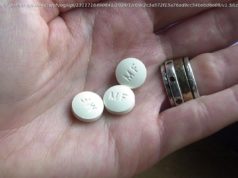The government has ordered more safeguards at an Abbott Nutrition plant. But the lack of reporting requirements and limited testing make it hard to monitor the deadly bacterium that led to a recall.
Riley San Miguel said her son, Kru, was barely a month old when he started crying all the time, not wanting to eat. When he developed a fever, he was quickly admitted to an intensive care unit. His spinal fluid was infected with bacteria, and it was spreading to his brain. The doctors believed it had probably come from his infant formula.
“Initially, doctors were worried Kru wasn’t going to make it,” said Ms. San Miguel, 23, who lives in Sonora, Texas. The baby underwent the first of several operations on his brain to control escalating seizures and swelling, and when he could no longer breathe on his own, they put him on a ventilator for 21 days. Eventually, most of the right side of his brain had to be removed. Her son, she learned, had been exposed to Cronobacter sakazakii, a deadly bacterium that is often linked to babies who consume powdered formula and can cause serious brain damage, developmental disabilities and death. Health officials analyzed two open cans of formula from Ms. San Miguel’s home; one tested negative and the other did not have enough product left to test. Kru fell ill in August 2019, more than two years before similar infections in four babies — two of them fatal — triggered a voluntary recall at an Abbott Nutrition plant in Sturgis, Mich., that manufactured formula consumed by the latest sickened babies. The recall helped lead the way to a nationwide shortage of infant formula that has left parents struggling to feed their children; the Biden administration has responded by working with Abbott to restart production and flying in additional supplies from Europe. As with Kru’s illness, no link was established between infections in the four recent sick babies and production at any Abbott Nutrition plant. But while most of the attention has been focused on fixing the dire supply shortfall, regulators are confronting deeper issues of safety that persist in the manufacturing of powdered infant formula. There is no comprehensive mechanism for detecting or investigating Cronobacter infections, and only one state, Minnesota, requires doctors and laboratories to report cases to the authorities. Manufacturers are left to conduct tests themselves on a relatively small sample of their production, with less than 1 percent of the Abbott plant’s total output required to be tested. The combination of blind spots makes it difficult to trace infections to their source and could leave families at risk of future shutdowns and infant fatalities. The Sturgis plant has had troubles going back to 2010, when beetle parts in formula triggered another recall. In recent years, inspection reports show, federal inspectors found standing water in manufacturing areas, a fan loaded with dust and debris positioned near a formula drying area and sanitary zones that were not cordoned off. In October, a whistle-blower complaint from a former Sturgis quality assurance worker landed with the Food and Drug Administration. He claimed that, in 2019, the plant did not destroy an entire batch of formula where problematic micro-organisms had been found because “senior management was under significant pressure to meet its ‘numbers’”; and that the company was “sanitizing” files before providing them to F.D.A. auditors, failing to disclose details about micro-organisms it found. Abbott has said that no Cronobacter samples from the four sick babies matched ones found at the Sturgis plant. An opened container of formula consumed by one of the babies had tested positive for two strains of Cronobacter, the company said, but those strains also did not match any that were found at the plant, and one matched a sample found on a water bottle that had been used to mix the formula.
“The formula from this plant did not cause these infant illnesses,” the company said. Abbott has said that the former employee who filed the whistle-blower complaint was fired for violating its food safety policies and that he has made “evolving, new and escalating” claims since then. The company said it expected to be able to address all of the F. D. A. ’s concerns by the time it reopens the Sturgis plant within the next two weeks. A consent decree the company signed with the government provides a series of new safeguards, including hiring a qualified expert to oversee improvements at the plant and notifying the F.D.A. if it finds any contamination. Samples of Cronobacter and salmonella found must be stored for three years.
“We are confident that we can continue to produce safe, high-quality infant formula at all of our facilities as we have been doing for millions of babies around the world for decades,” Abbott said.






